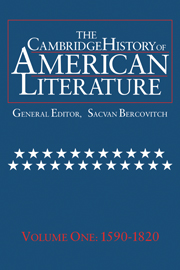Book contents
- Frontmatter
- Introduction
- THE LITERATURE OF COLONIZATION
- NEW ENGLAND PURITAN LITERATURE
- BRITISH-AMERICAN BELLES LETTRES
- THE AMERICAN ENLIGHTENMENT, 1750–1820
- 1 Finding the Revolution
- 2 What is Enlightenment? Some American Answers
- 3 Religious Voices
- 4 Writing the Revolution
- 5 The Literature of Public Documents
- 6 The Limits of Enlightenment
- THE LITERATURE OF THE REVOLUTIONARY AND EARLY NATIONAL PERIODS
- Chronology
- Bibliography
- Index
4 - Writing the Revolution
from THE AMERICAN ENLIGHTENMENT, 1750–1820
Published online by Cambridge University Press: 28 March 2008
- Frontmatter
- Introduction
- THE LITERATURE OF COLONIZATION
- NEW ENGLAND PURITAN LITERATURE
- BRITISH-AMERICAN BELLES LETTRES
- THE AMERICAN ENLIGHTENMENT, 1750–1820
- 1 Finding the Revolution
- 2 What is Enlightenment? Some American Answers
- 3 Religious Voices
- 4 Writing the Revolution
- 5 The Literature of Public Documents
- 6 The Limits of Enlightenment
- THE LITERATURE OF THE REVOLUTIONARY AND EARLY NATIONAL PERIODS
- Chronology
- Bibliography
- Index
Summary
First to study the Revolution, the historian David Ramsay also first proclaims the utter centrality of its writings. “In establishing American independence”, he observes in The History of the American Revolution (1789), “the pen and the press had merit equal to that of the sword”. Writings can equal events because events, small in themselves, often take their primary significance from the symbolism that language gives them. Five people die in the Boston Massacre; just eight, in the battle of Lexington. Clearly, it is not size and scale that shake the old order but something else. The international hue and cry of the Intolerable Acts in 1774 take place over 342 chests of tea dumped in Boston Harbor. In the war, General Washington's Continental army sometimes dwindles to fewer than four thousand soldiers, and that army's arduous retreat to Valley Forge in the winter of 1777 takes it only twenty miles from the British army in Philadelphia. Numbers are even smaller in the South. The battles of King's Mountain and Cowpens, major American victories in 1780 and 1781, engage fewer than three thousand at a time. Important in themselves, such incidents take their fullest significance from revolutionary ideology or from the way they contribute to a familiar sense of story and to an understanding of occurrence. Either way, the prime value of a revolutionary event is often in the telling.
- Type
- Chapter
- Information
- The Cambridge History of American Literature , pp. 426 - 469Publisher: Cambridge University PressPrint publication year: 1994



